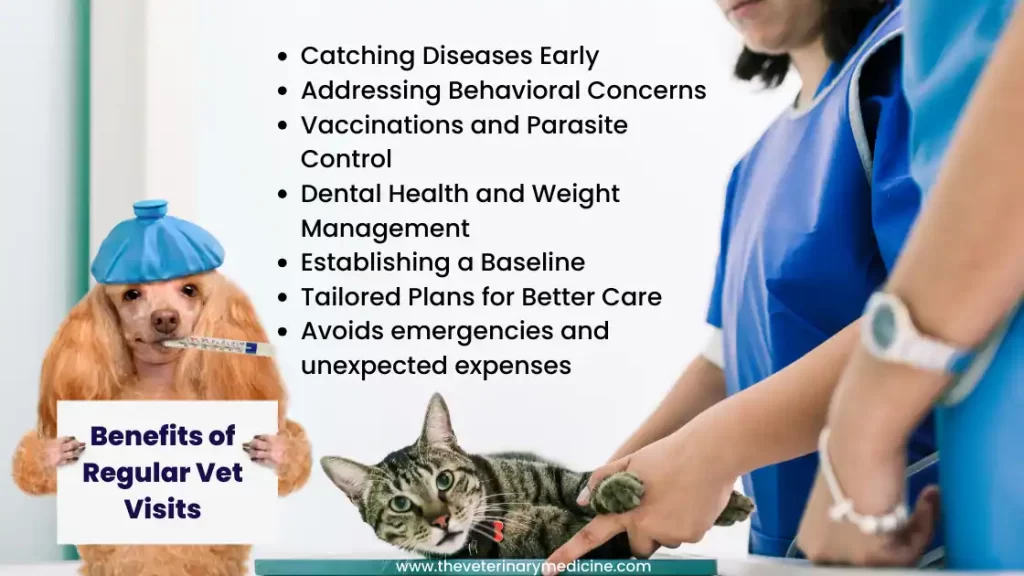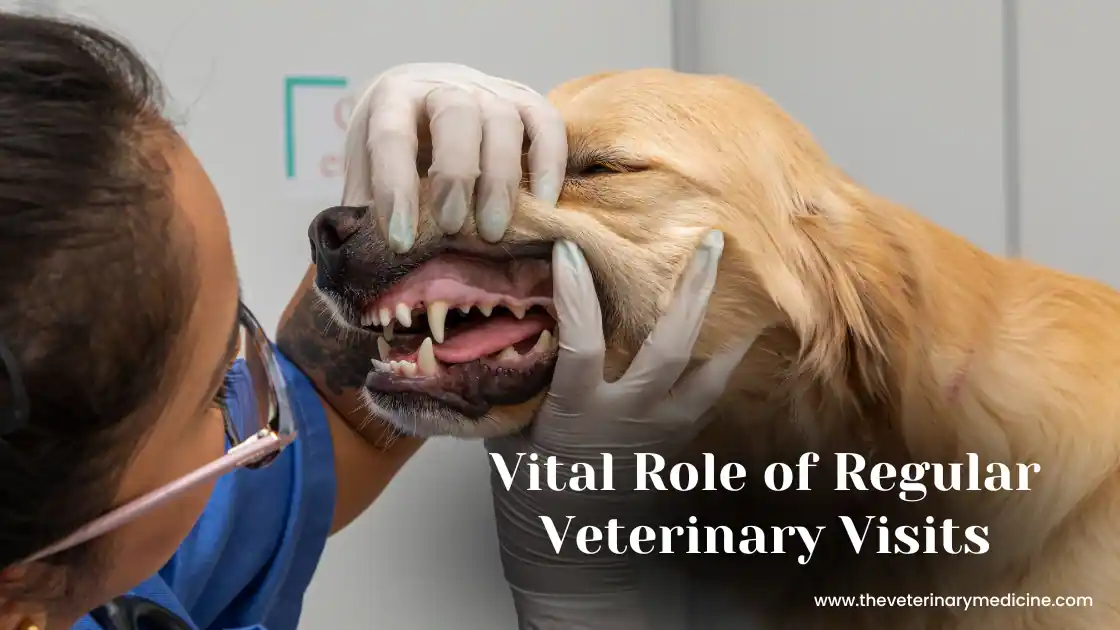Regular vet visits play an important role in prevention of diseases, early diagnosis of health problems like cardiac issues, skin problems, obesity, ectoparasite infestation, hypothyroidism, dental problems, hair fall, behaviour concerns and helpful in tailoring a pet care plan according to the specific need of pet. Elder/ senior pets need to visit more often than younger pets to address other issues like early detection of chronic kidney, osteoarthritis, and degenerative changes in the bones. According to the need of pet your vet may advice blood tests, radiographs, ultrasonography, supplementation, or medicines. Think if these issues are managed early then you will be able to save money, emotional stress will be less, pet will also suffer less and will stop most of the problems before they convert into actual emergencies.
It is no wonder our pets hold a special place in our hearts and homes. But just like we prioritize our own health with regular checkups, our furry companions thrive with consistent veterinary care. While a trip to the vet might not be your pet’s favourite adventure, the benefits far outweigh the temporary stress. Think of it as an investment in a longer, happier, and healthier life together.
So, why exactly are regular veterinary visits so crucial?
1. Catching Diseases Early: The Power of Proactive Care
Many pet owners may wonder why these visits are necessary, especially when their furry companions seem perfectly healthy. Unlike humans, pets cannot tell us exactly how they are feeling. Pets, much like humans, can develop various medical conditions that may not manifest obvious symptoms until they have progressed to advanced stages. Initial illness symptoms may remain unnoticed and by the time they exhibit obvious symptoms, a condition might already be advanced. Like by the time chronic kidney disease (CKD) get diagnosed 65-75% of the kidneys are already damaged and prognosis is mostly guarded to poor. Especially the elusive cats, are masters at concealing signs of illness. Regular checkups allow to detect and uncover hidden clues through thorough examinations and, if needed, diagnostic tests. It helps in identifying subtle signs of illness, and initiate prompt intervention. Early detection of issues like dental disease, arthritis, or even cancer makes a world of difference in treatment success and prognosis. One of the primary benefits of regular veterinary visits is the early detection of potential health issues.
2. Establishing a Baseline: Knowing Your Pet's "Normal"
No two pets are exactly alike. During routine visits, your vet builds a unique profile of your pet’s health, including temperament, vital signs, weight, and body condition. Sometimes undergoing hereditary disease screening, profit from routine screening for common species- or breed-specific diseases; like polycystic kidney disease or cardiac issues etc.
Dental care, often overlooked by pet owners, is crucial in preventing dental diseases that can lead to pain, infection, difficulty in eating and other systemic health issues. Regular veterinary visits include thorough dental examinations and cleanings to prevent dental diseases that can impact a pet’s overall health.
Maintaining an optimal weight is essential for a pet’s health and longevity. During veterinary visits, professionals can provide valuable insights into a pet’s nutritional needs, helping pet owners choose the right diet. Additionally, veterinarians can monitor a pet’s weight and body condition, offering guidance on weight management if necessary. Proper nutrition and weight control play pivotal roles in preventing obesity-related diseases, promoting better joint health, and ensuring an active and happy life for pets.
This personalized baseline becomes invaluable in identifying even subtle changes that could signal potential issues. Imagine it as your pet’s own health map, guiding your vet towards the best course of action when needed.
3. Prevention is Key: Vaccinations and Parasite Control
Vaccinations act as shields, protecting your pet from potentially life-threatening diseases like rabies, distemper, and parvovirus. Regular endoparasite and ectoparasite control, meanwhile, keeps fleas, ticks, intestinal worms, tick fever, anaemia, and heartworms away, also prevents discomfort and potentially serious health complications. These preventive measures are far more affordable and less stressful than treating established infections or infestations. Early detection not only improves treatment outcomes but also helps mitigate potential complications, leading to a longer and healthier life for your pet.
4. More Than Just Physical Health: Addressing Behavioral Concerns
Our furry friends experience emotions and anxieties too. Regular checkups provide an opportunity to discuss behavioral changes like excessive barking, scratching, or hiding. Your vet can rule out any underlying medical causes and offer guidance on training or behavior modification strategies, promoting a happier and more harmonious home life for everyone.
5. Building a Bond with Your Vet: Trust and Partnership
Regular vet visits foster a trusting relationship, making your pet more comfortable during examinations and allowing the vet to provide early diagnosis and the best possible care. Additionally, you gain a valuable partner in navigating your pet’s health journey, from puppyhood or kittenhood to their senior years.

Frequency of Visits: Tailored to Your Pet's Needs
The ideal frequency of veterinary visits depends on your pet’s age, breed, and overall health. Puppies and kittens typically require more frequent checkups during their first year of life, while adult pets might need annual or biannual visits. Discuss a personalized schedule with your veterinarian based on your pet’s unique needs.
Making the Experience Positive: Tips for a Smooth Vet Visit
Most of the time, vet visits can be stressful for both pets and their humans but surely more for pets. Here are some tips to make the experience more positive:
- Schedule appointments during calm times: if your pet have stress or anxiety during vet visits, not friendly with other pets then avoid peak hours and opt for mornings or less busy days.
- Practice positive reinforcement: Reward your pet for good behaviour at home and during the visit. It will encourage them and will help in reducing stress.
- Bring familiar comforts: Carry along a favourite toy or blanket which will help in providing a sense of security.
- Communicate openly with your vet: Prepare your list of queries and concerns about your pet’s health and condition. Do not hesitate to ask questions and raise any concerns.
Remember, regular veterinary visits are not just about identifying problems; they are about celebrating your pet’s health and building a foundation for a long, happy life together. From early detection of health issues to preventive care, nutrition, dental health, and behavioral well-being, these visits are a comprehensive investment in the holistic welfare of our beloved companions. So, schedule that appointment, pack some treats, and embark on a journey of preventative care and proactive love for your furry best friend. They will (secretly) thank you for it!
Bonus Tip: Consider pet insurance! It can help manage the financial burden of unexpected veterinary expenses, giving you peace of mind and ensuring your pet receives the best possible care, regardless of the situation.
By prioritizing regular veterinary visits, you are not just giving your pet the gift of health; you are investing in a lifetime of shared memories and unconditional love.



![Read more about the article Bachelor of Veterinary Science [BVSc] Bachelor of Veterinary Science and Animal Husbandry [BVSc & AH]](https://theveterinarymedicine.com/wp-content/uploads/2021/10/Bachelor-of-Veterinary-Science-and-Animal-Husbandry-BVSc-AH-A-Detailed-Course-Overview-300x169.jpeg)

